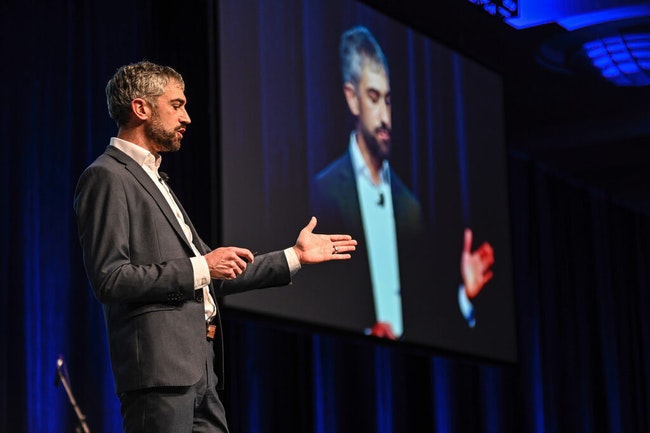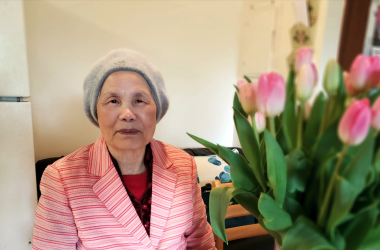
Ben Cannon, executive director of the state Higher Education Coordinating Commission, speaks on Monday, Dec. 6, about education needs in Oregon. (Ron Cooper/Oregon Capital Chronicle)
Oregon can’t recover jobs lost during the pandemic and meet the needs of industry without new investments in training the workforce, state leaders declared Monday.
Gov. Kate Brown and Ben Cannon, executive director of the state Higher Education Coordinating Commission, underscored that point in speeches to an annual gathering of business leaders and public officials.
“If we emerge from the pandemic with essentially the same higher education workforce systems that we had going in, we will continue to produce the same inequitable outcomes that so frustrate employers and educators and other Oregonians today,” Cannon said.
The two spoke at the Oregon Business Plan Leadership Summit, which focuses on the state’s economic future. The governor and Cannon said without greater state investment in higher education, career technical training, certification programs and other postsecondary pathways, many Oregonians will fall further behind from the pandemic, industry will face tighter labor markets and racial and socio-economic inequity will grow.
Cannon called investments under the federal infrastructure legislation and potentially through the Build Back Better framework a “once-in-a-generation opportunity” to fund greater access to the state’s universities and colleges. He said there could be more apprenticeships and certified training in trades and manufacturing.
Overall enrollment in Oregon’s public colleges and universities is down 15% in the last two years, according to the Higher Education Coordinating Commission. It’s especially acute at the state’s community colleges.
Cannon and Brown discussed the need for a greater number of manufacturing and health care workers in the state.
“Our opportunities around manufacturing are extraordinary,” Brown said. “With the federal resources coming in, this is a moment we can’t afford to waste.”
Cannon called for continued investment in the “Future Ready Oregon” program that Brown announced in 2018 to close the skills gap between what students were learning through postsecondary education and what was needed in the labor market. That included investment in career technical education, in helping mid-career construction workers start their own companies and providing grants to establish new businesses.
Cannon also presented his commission’s plan, finalized in August, for modernizing university curriculums, job training programs and apprenticeships to meet Oregon’s labor needs. Objectives are to make education after high school more relevant to existing and future jobs and making education and training more accessible to low-income Oregonians and those who are returning to school while working full time.
Cannon and Brown said there is a need for government-supported services for Oregonians pursuing postsecondary options such as affordable housing, health care and child care. They said this would boost the number of people from historically underrepresented groups enrolling in colleges, universities and certification programs and help to close income gaps exacerbated by the pandemic.
Brown said this would be part of the $200 million package put together by her Racial Justice Council she is taking to the Oregon Legislature in February for approval.
“I think it’s absolutely imperative that we keep racial justice at the forefront of our recovery efforts,” Brown said, “and that particularly is around workforce training.”
Cannon said the Higher Education Coordination Commission is calling upon state leaders to ensure “postsecondary learners can afford to meet their basic needs. For too long policymakers have thought about affordability of postsecondary education primarily as a matter of tuition.”
He said the commission “increasingly hears from students who struggle with housing and food insecurity and the high price of textbooks. We must address those basic needs.”
Cannon said the state had been historically underfunding postsecondary education and job training programs over the last 20 years, offering less than a third of the student financial aid provided in Washington state.
Cannon said the commission plans to work with Brown on a legislative package that would provide more apprenticeships, career programs at community colleges and expand the ability for students to get community college course credit for prior learning and life skills.
Oregon Capital Chronicle is part of States Newsroom, a network of news bureaus supported by grants and a coalition of donors as a 501c(3) public charity. Oregon Capital Chronicle maintains editorial independence. Contact Editor Les Zaitz for questions: [email protected]. Follow Oregon Capital Chronicle on Facebook and Twitter.
STORY TIP OR IDEA? Send an email to Salem Reporter’s news team: [email protected].









